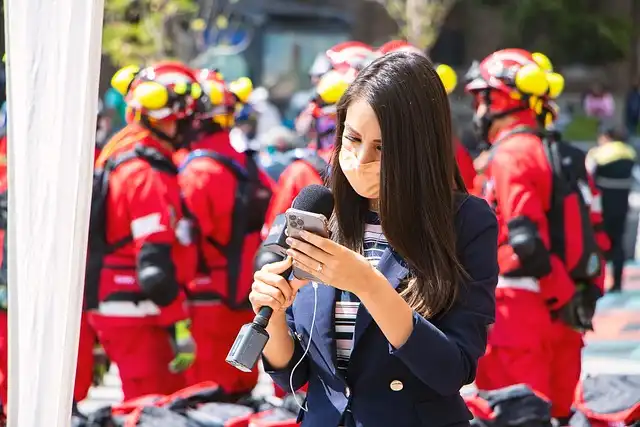Immigrant Journalists & Press Freedom Under Threat

Immigrant journalists face increasing risks in the US due to the Trump administration's stance on media and immigration. Reporting on sensitive topics may jeopardize their status. Legal experts weigh in.
Still, “if you are a reporter … and you write an op-ed important of the Trump management, then the Öztürk example is one where they did go after someone,” he continues, recommending that reporters in the U.S. on temporary visas, permits, or DACA bring documents with them in all times, and think about heater phones when traveling abroad “so you are less likely to be harassed when you return.”
“When the tale is about ICE raids … editors most likely to the press reporter who has DACA and an extra rooted perspective,” she states. “It’s easy to place that individual around to cover it. Yet it likewise means placing yourself at higher danger.”
Increased Risks for Immigrant Journalists
Rangel’s nervousness owes to the Trump management’s aggressive stance towards the media, with various claims targeting electrical outlets like CBS and ABC for their coverage; FCC probes into NPR and PBS for supposed web content bias; and the barring of several significant outlets from their normal areas at the Oval Workplace and the Government.
For both of their March apprehensions, the federal government conjured up an odd lawful principle to suggest that the students stood for a major risk to nationwide security– Öztürk for publishing an op-ed in her institution paper critical of U.S. and Israeli policy, and Khalil for his involvement in pro-Palestine campus protests.
“The government claimed lots of, sometimes that they are gang members, and we claimed no, they are not, we do not have any type of evidence that they are,” recalls Rangel, an independent reporter living in Miami. “And so, I began to question if I am in threat because of that.”
“When the story is regarding ICE raids … editors go to the reporter that has DACA and an extra rooted perspective,” she claims. “If something comes up, I might state no, you take this one.
“I was depressing because I lost the possibility of getting on the ground covering my region, however at some time, I really felt alleviation due to the fact that functioning below in the united state, covering Venezuela, I can do it with even more freedom and a sense of safety and security. I can additionally sustain various other journalists in Venezuela via our network,” she says. “Currently, it’s like … uff.”
Government’s Stance on Press Freedom
As these press constraints are increasing, so is the detention of worldwide students, many plainly Rumeysa Öztürk, a graduate student at Tufts University, and Mahmoud Khalil, a college student at Columbia College.
For her component, Rangel insists she’s dedicated to the work in spite of the threats. “I assume it’s more vital to defend complimentary expression below, because if you can guarantee free expression in the united state, it’s feasible to equip adjustments in other countries.”
“Prior to, I felt I had protection, now I recognize that security is lightweight at best,” she describes. “If something turns up, I could say no, you take this one. I don’t wish to unnecessarily put myself in the line of fire.”
“I was depressing since I shed the opportunity of being on the ground covering my area, however at some factor, I really felt relief since functioning here in the United state, covering Venezuela, I can do it with more flexibility and a feeling of security. I can additionally support other reporters in Venezuela with our network,” she says. We have reporters that are concerned due to the fact that of their own migration standing,” she states.
“Once a government declares the power to make use of residency status as a cudgel to regulate speech, points intensify rapidly and unexpectedly,” composes Seth Stern with Liberty of journalism Structure, warning reporters can be following.
“Each journalist has to identify their risk resistance in their very own scenario and probably speak with their editor if they feel awkward about covering a certain occasion or composing a particular post,” he includes.
“I came here due to the fact that I felt like this is a free space to continue doing journalism,” she kept in mind, defining the placing risks she dealt with as a result of her coverage on corruption in Venezuela’s southern Amazon region.
“The worries we are listening to now can fall into 2 containers. The very first is worries reporters may have as a result of the reporting they do, no matter their standing. After that we have reporters that are concerned as a result of their very own immigration status,” she says.
Legal Perspectives on First Amendment Rights
In late March Clavel Rangel remained in Toronto for a journalism seminar. While there, she reported on the Trump administration’s deportation of Venezuelan migrants to El Salvador, which is when she began getting messages concerning a suggested U.S. traveling restriction on Venezuelans.
Joel Simon, founding director of the Journalism Protection Effort at the Craig Newmark Graduate School of Journalism in New York City, reviews the dangers non-citizen immigrant reporters encounter in the present political environment, especially when covering migration.
A reporter because 2016, Bermudez states she’s stressed about becoming a target of ICE agents herself, including she’s begun rubbing her social networks feed of anything that might jeopardize her status amid records of migration authorities expanding social media sites information collection.
“If you are simply reporting the news, that is clearly covered under the First Amendment. And I would certainly think you should not be afraid being put into expulsion proceedings for that,” states Stephen Yale-Loehr, a retired teacher of technique at Cornell Regulation Institution who functioned 40 years as a migration lawyer.
1 First Amendment2 immigrant journalists
3 immigration status
4 media risks
5 press freedom
6 Trump administration
« Firefighter Cancer Research Cuts: Trump’s Impact & Health RisksTrump Admin: Attacks on Environmental Groups & Free Speech »
